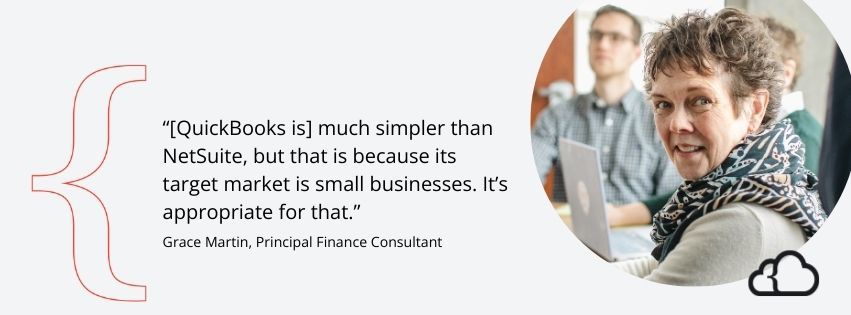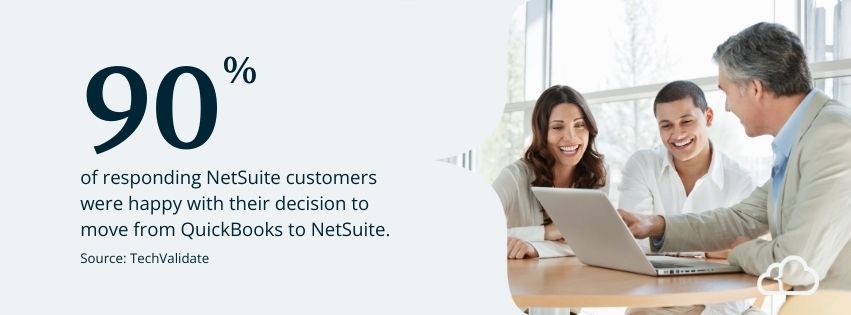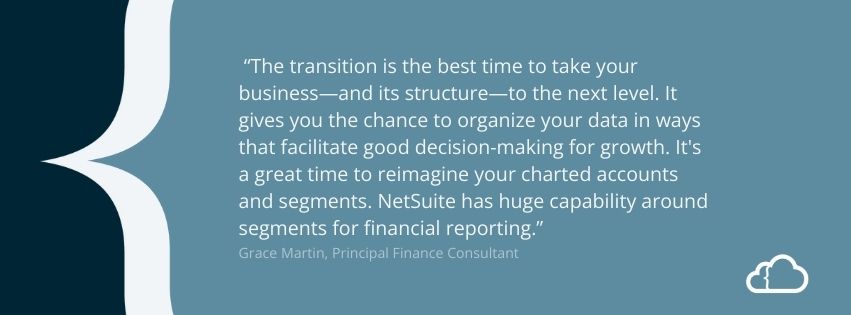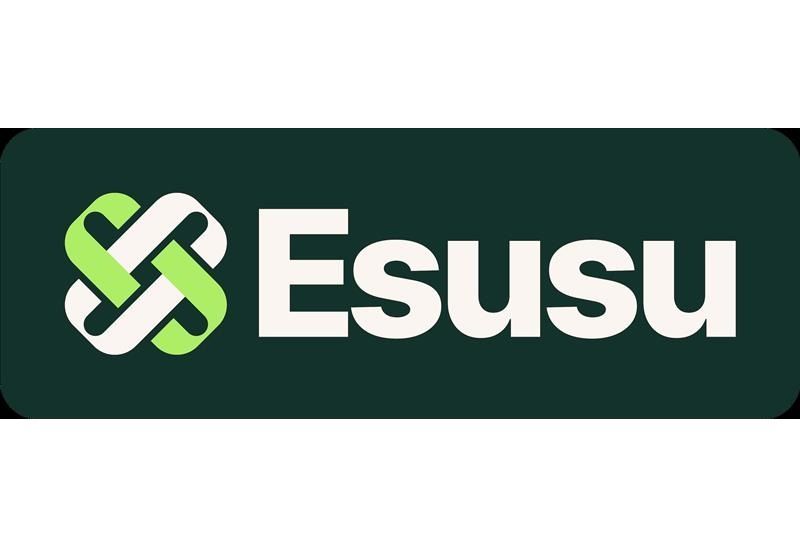The Transition From QuickBooks to NetSuite
Simple accounting solutions are great for startups and small companies, but at some point, growing businesses need more. That's when they transition to ERP systems.
If you run a growing business, you can’t let manual processes, errors, and a lack of real-time data limit your operations. Otherwise, business opportunities—such as easy “Made in USA” compliance, automated inter-company transactions, and cross-subsidiary fulfillment—become challenges instead.
Unfortunately, many companies never reach their full potential because they don’t upgrade software once they’ve outgrown point solutions like QuickBooks. They stick with what’s familiar and cheap, making their processes inefficient and their system overburdened with excess data.
Enterprise resource planning (ERP) platforms like NetSuite give businesses strapped by simplistic software room to breathe and grow. They unite all company processes into a single database, allowing a free flow of data, eliminating silos, and facilitating more automation. Essentially, ERPs equip companies to become more successful.
SuiteDynamics works with NetSuite to customize and implement ERP systems, and our experts are adept at the QuickBooks/NetSuite transition. We can help your company evaluate your current processes, map out which NetSuite modules and features you’ll need, and implement the right software to take your business to the next level.
Read our quick guide below about the transition from QuickBooks to NetSuite, and then schedule a free consultation with us. Tell us about your business goals, and we’ll ensure your team has the software to expand operations and succeed.
Key Takeaways
1. QuickBooks vs. NetSuite: QuickBooks is an accounting software tailored for small to medium-sized businesses, offering various versions like Online and Desktop. NetSuite, in contrast, is a web-based enterprise resource planning (ERP) system designed for companies looking to scale, with more advanced features and cross-departmental integration.
2. Flexibility and Growth Potential: While QuickBooks provides essential accounting tools for smaller businesses, NetSuite offers modular solutions that can expand with a company's needs. As Grace Martin from SuiteDynamics notes, NetSuite allows businesses to "pay for what you need" and can support operations from small startups to complex international enterprises.
3. Critical Transition Considerations: When moving from QuickBooks to NetSuite, businesses should focus on two key strategies: data hygiene and process reimagination. This means thoroughly cleaning data before migration and using the transition as an opportunity to restructure and optimize business processes rather than simply recreating the existing system.
4. Real-World Benefits of Upgrading: A Preferred Popcorn case study illustrates the tangible advantages of switching to a more robust system. After implementing NetSuite, the company experienced improved inventory tracking, automated payment processes, better customer service, and more insightful business performance dashboards.
5. Comprehensive Capabilities Matter: NetSuite offers significant advantages over QuickBooks, including multi-currency support, advanced automation, real-time analytics, and complex accounting processes like revenue recognition. A TechValidate survey found that 90% of businesses were satisfied with their move from QuickBooks to NetSuite, with 89% reporting improved growth potential.

What Is QuickBooks?
Developed by Intuit, QuickBooks is a widely used accounting software that helps small- and medium-sized businesses manage financial operations. It simplifies tasks such as invoicing, payroll, expense tracking, inventory management, tax preparation, and financial reporting.
SuiteDynamics Principal Finance Consultant Grace Martin says QuickBooks is an excellent choice for start-ups and similar businesses.
“It's much less expensive,” she says. “It's also much simpler than NetSuite, but that is because its target market is small businesses. It’s appropriate for that.”
Main Versions
QuickBooks has several versions, but only a few focus on small to medium-sized businesses.
1. QuickBooks Online (QBO)
A cloud-based solution that allows access from any device with internet connectivity. It offers multiple subscription levels (e.g., Simple Start, Essentials, Plus, Advanced) to accommodate different business sizes and needs.
2. QuickBooks Desktop (QBD)
A locally installed version providing robust accounting features with options like:
- Pro: Designed for small businesses needing essential accounting tools.
- Premier: Adds industry-specific features for sectors like manufacturing, nonprofits, and retail.
- Enterprise: Offers advanced functionality for larger businesses, including extensive reporting, user roles, advanced scalability, custom options, and inventory management.
Each version serves a distinct business niche, allowing flexibility for growth and unique needs.

What Is NetSuite?
Owned by Oracle, NetSuite is a cloud-based ERP system that offers an all-in-one solution for managing core business processes. It unites business areas such as accounting, financial planning, customer relationship management (CRM), inventory, e-commerce, and supply chain operations on a single database. This system integration offers functionality across departments so users can manage operations without needing multiple software solutions.
Martin says one of NetSuite’s primary advantages over QuickBooks is that it’s designed for growth.
“NetSuite will expand with your business to basically any scale,” she explains. “It’s modular, so users can purchase the modules appropriate for their businesses, be that manufacturing, fixed asset control, or whatever. You pay for what you need.”
Of course, NetSuite has other advantages, including its ability to support complex global operations with multi-currency transactions, tax compliance, and multi-subsidiary management. These features make it ideal for international businesses.
The ERP system also offers advanced automation, robust reporting, and real-time analytics that surpass QuickBooks’s capabilities, and it handles all high-level accounting processes, including amortizations and revenue recognition, a capability missing for QuickBooks users. Plus, it supports standard costing, which makes it popular with the manufacturing industry.
These and many other benefits separate the old methods from the new ones. An increasing number of firms have migrated from QuickBooks, spreadsheets, and others and shown demonstrable benefits as a result. According to a TechValidate survey, 90% of responding NetSuite customers were happy with their decision to move from QuickBooks to NetSuite, and 89% said NetSuite helped boost their growth more than QuickBooks.
Case Study: Preferred Popcorn
Preferred Popcorn is a booming popcorn business that faced challenges from QuickBooks’ lack of CRM functionality, poor inventory tracking, and absence of customization options. The company also had difficulty accessing real-time inventory data while using QuickBooks and spreadsheets.
Consequently, it dealt with labor-intensive stock tracing processes and accuracy concerns. Yet, after an acquisition and expansion into new sales channels, Preferred Popcorn switched to a comprehensive ERP platform that could truly power the business.
Preferred Popcorn then reviewed four separate ERP providers and chose NetSuite, implementing the new system in under three months. Today, Preferred Popcorn tracks products faster and more accurately. It also better serves customers with automated payment processes and has improved insights into business performance through dashboards tailored to employee needs.
As a result, the company gained efficiency across core business functions, allowing employees more time to focus on value-added activities.

Tips for a NetSuite Transition
Companies create a wealth of new opportunities when transitioning from QuickBooks to NetSuite. Still, the journey isn’t always an easy one. Users must navigate new system complexities, data migration issues, integration challenges, and more. As with everything in the business world, success doesn’t come easy.
That’s why Martin offers a few tips for companies eager to replace their old QuickBooks software with a bigger, better NetSuite ERP.
1. Clean Your Data
Nothing bungles a data migration like bad info. It can cause system errors, data loss, inaccurate reporting, and more. Therefore, clean up your data before you take the first step in a NetSuite transition.
“Write off old receivables and payables,” Martin advises. “Delete customers who are no longer customers or vendors that you no longer use. There’s no reason to import that data. Cleaning up your data, in general, is the bottom line."
2. Don’t Replicate
Don't try to recreate your QuickBooks environment in NetSuite—you’ll just be wasting the system. Instead, dream up new visions for your reporting and data capture, and use this journey to revolutionize the way your company works.
You can always use your NetSuite partner to help develop ideas. For instance, SuiteDynamics experts are skilled at evaluating a company’s operations and finding creative ways to hone its processes using NetSuite’s features.
“The transition is the best time to take your business—and its structure—to the next level,” Martin says. “It gives you the chance to organize your data in ways that facilitate good decision-making for growth. It's a great time to reimagine your chart of accounts and segments. NetSuite has huge capability around segments for financial reporting.”
Schedule a free consultation with the SuiteDynamics team to talk about your company, its business needs, and its transition from QuickBooks to NetSuite. We’ll help examine every piece of your operations, find ways to improve your processes and meet your needs with quality NetSuite solutions.
Software doesn’t have to be a headache. Let us show you how well it can work for your company.
Blow Away the Competition
Stop fighting a software system that's working against you. Instead, enjoy the benefits of an ERP that knits your operations together seamlessly and provides the data and analysis you need to trounce your competition.
We know you can rise in your industry.
Team up with SuiteDynamics to develop the ERP system your business needs. As a NetSuite Alliance Partner, we customize and implement NetSuite ERP software for clients in any industry.
The partnership doesn't stop there. We can work with you long after go-live, maintaining the system, training staff, and adjusting the software to accommodate your expansion. Start by contacting us for a free consultation.
Frequently Asked Questions
How should companies handle historical financial data when migrating from QuickBooks to NetSuite?
Most companies migrate the detailed transactions at the moment of go-live, plus two years of summary financial data for reporting purposes. This approach balances the need for historical analysis with system performance considerations. NetSuite can maintain period-by-period comparative reporting even with summarized data.
For regulatory compliance, companies should consult with their auditors about specific record retention requirements before migration. QuickBooks data can remain accessible in read-only mode after migration.
What critical integrations should be evaluated when moving from QuickBooks to NetSuite?
Before migrating, companies should inventory all systems currently integrated with QuickBooks, including:
- Payroll processing (ADP, Paychex, Gusto)
- Banking and payment platforms
- E-commerce systems (Shopify, Amazon, etc.)
- CRM solutions (Salesforce, HubSpot)
- Industry-specific tools
NetSuite offers superior integration capabilities through its SuiteCloud platform, but each integration requires planning and potential reconfiguration. Companies should prioritize integrations based on business impact and evaluate whether NetSuite's native functionality might replace some third-party systems.
Integration complexity varies widely, with setup costs ranging from a few thousand dollars for standard connectors to tens of thousands for custom integrations requiring significant development work.
We pull information from NetSuite material, SuiteDynamics experts, and other reliable sources to compose our blog posts and educational pieces. We ensure they are as accurate as possible at the time of writing. However, software evolves quickly, and although we work to maintain these posts, some details may fall out of date. Contact SuiteDynamics experts for the latest information on NetSuite ERP systems.
Disclosure: This article was developed with the assistance of Claude, an AI created by Anthropic. Our editorial team used Claude as a collaborative writing tool, carefully reviewing, editing, and fact-checking all AI-generated content. The final text has been thoroughly vetted to ensure accuracy, clarity, and alignment with SuiteDynamics' editorial standards. We take full responsibility for the content presented in this article, maintaining our commitment to providing reliable and informative insights to our readers.











